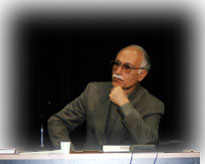| ` |
Marriage With a Nine Year Old Girl
Rights of Women in Islam
Hypothesis:
The Prophet of Islam married Ayisha, a
nine ear old girl, at the time when he was older than forty and this type of
marriage is a crime!
Besides the invalidity of the historical quotations for
determining persons’ ages, especially in the primitive and illiterate society of
Mecca at a time when birth certificates were nonexistent, one should ask the
critics what criterion they use in establishing crimes errors and omissions to
judge the validity of marriages? How much should the age difference between a
couple be before their marriage is considered a crime? On what basis or by what
criterion should the difference of ages of the couple be measured?
In determining the above, one should consider either the law and regulations, or
the nature, or religious laws, or consensus of both sides, or judgment and
public opinion. Is there any other way? Let us examine each category.
From the perspective of the law and regulation, not only in those days, but even
today (even in the United States of America or Europe,) there are no laws
establishing a minimum or maximum difference between the ages of the couple
wishing to marry each other. With reference to nature we find that even in the
world of plants and animals where the basis of copulation is to reproduce
offsprings, such limitations are nonexistent. As long as the male species has
the potential to produce not only there is no requirement for a minimum age
difference between couples, but that the younger age is preferred. With regards
to religious laws, as far as this writer is aware, they do not address the age
difference between the couple. If we consider the consensus of the couple, it is
not for others to try to impose their views on an affair wherein the couple has
agreed to marry each other after considering the benefit of taking such action
for themselves and for those related to them.
Is it not the practice of today’s advanced societies to base societal relations
on consensus and satisfaction of both sides involved? In so called advanced
societies neither homosexuality nor same sex marriages are considered a crime!
Nor are extramarital, unlawful and secret relationships between members of
opposite sex considered obscene and repulsive except for cases of rape! Finally,
if we consider public opinion and judgment we see that the people in today’s
societies are against such behavior. But is it possible to ask what the basis of
this public opinion is and what criterion is used to distinguish between moral
and immoral behavior? It is not a fact that today in every country there are
different norms of behavior and traditional values and standards of ethics? In
one place, homosexuals are executed, in another, a religious leader after being
exposed for having had homosexual relations (with minors) for fifteen years
while on duty, still retains his position as a religious leader! We observe
these differences of opinions and judgments every day in our time and in spite
of this we expect a tribal society of fourteen centuries ago to behave according
to our public opinion and judgment and act as we do in our society.
In today’s world a citizen is connected to other peoples and societies in dozens
of ways including scientific, cultural, artistic, athletics, recreational,
religious, social, etc., and the building blocks of a society are integrated by
composition of various and numerous social fabrics. But Islam was declared
during the days of ignorance and paganism, among scattered tribes at war with
each other and has stood for friendship, brotherhood, equality and freedom. In
those days, connection through lineage was considered among the strongest bonds.
With a simple wedding, not only two persons and two families, but two sects and
tribes would become related and would defend each other with their lives. In
order for the Prophet to strengthen the bond with the first converters to Islam,
i.e., Ali, Abubaker, Omar, Othman, etc., being under siege from all sides by
revengeful enemies, he either wedded his daughters to them, or wedded one of
theirs for himself. This was not done by reluctance and compulsion; rather, it
was done freely and with pride. It is astonishing that the critics of Islam on
the one hand emphasize the love and affection between the Prophet and his wife
Ayisha, and on the other, point to his marriage as a calamity! Who would be
frustrated by a marriage that took place with pride and consensus of the bride
and her parents and to the end of the couple’s life was filled with purity,
sincerity, love and affection, and was compatible with the common laws of the
society? What injustice took place that some people should want to ignore the
problems and injustices of their own actions and instead blame the actions
prevalent in a society of fourteen centuries ago?
Unfortunately, nowadays in the West, sexual issues constitute the main axis of
relationships between men and women compared to those days when strong factors
such as economics, guardianship, social norms and tribal traditions played a
strong part in the relationships. Have those who admire the beauty and youth of
Ayisha ever asked themselves why the Prophet wedded the sister (or daughter) of
Omar who was infamous for ugliness and bad manners for himself, and that after
all the followers of the prophet had turned down Omar’s offer of his sister or
daughter as their bride?
|
` |
![]()


